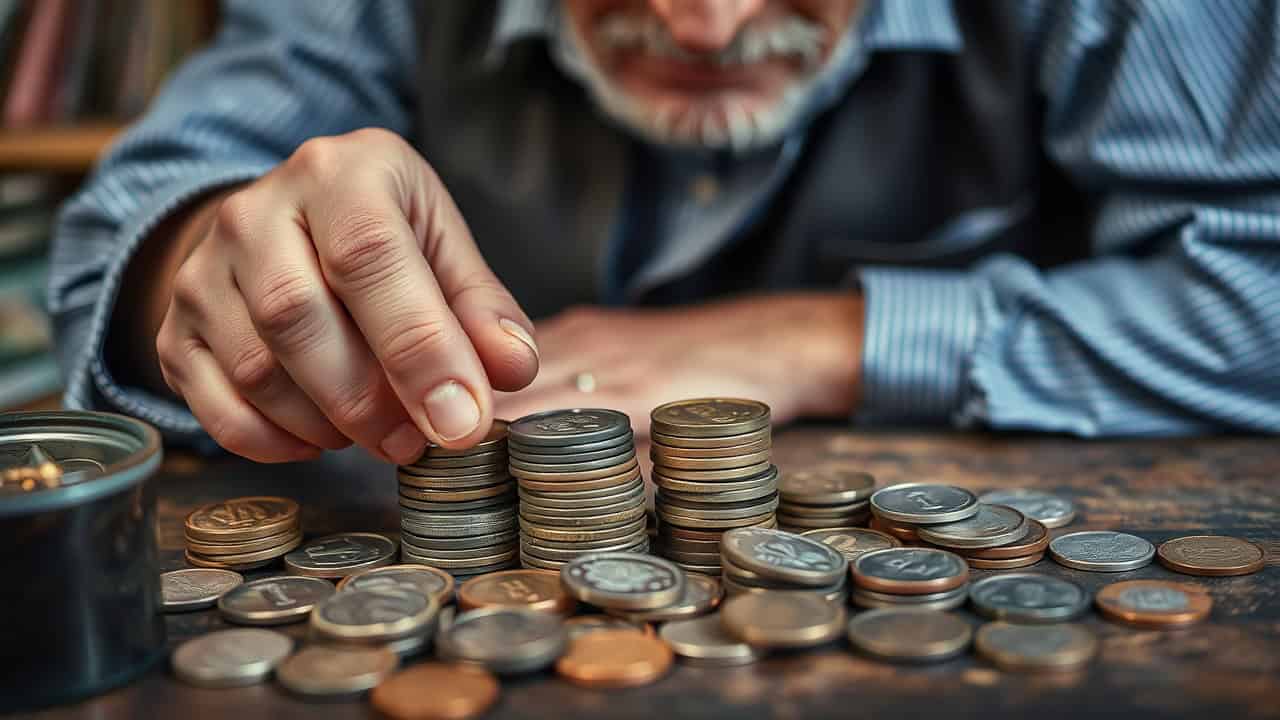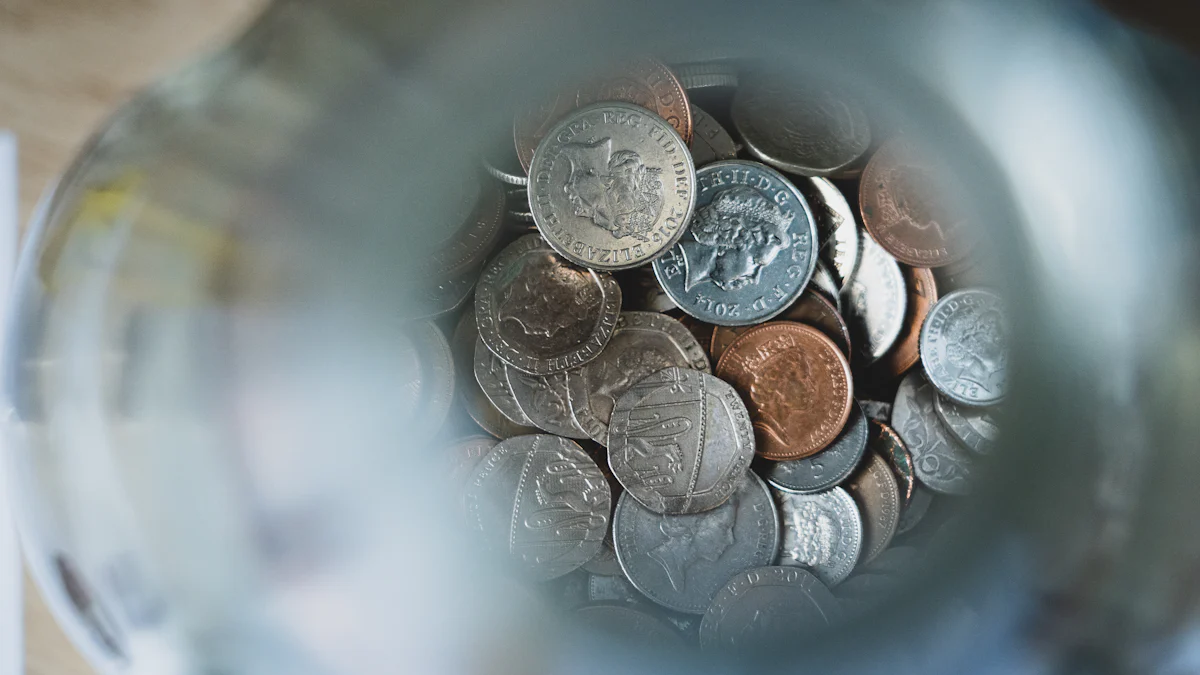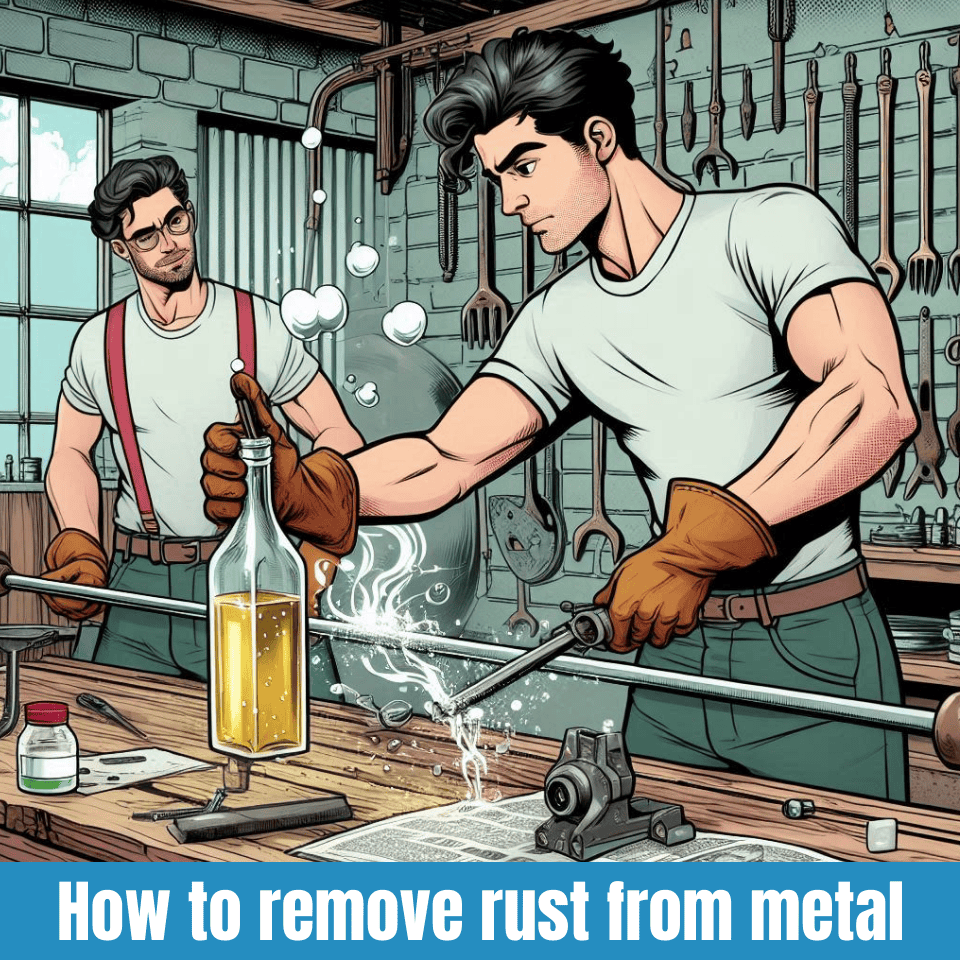
Ever wondered if those old coins in your drawer hold hidden treasures? Coins often carry historical and monetary value, making them prized possessions for collectors.
However, improper cleaning can reduce their value by up to 50% or more. Therefore, careful cleaning becomes essential to preserve the worth of your old coins.
Preserving the value and historical significance of your old coins is easy with the helpful tips and techniques outlined in this comprehensive guide.
Understanding the Value of Old Coins
Ever found an old coin and wondered about its worth? Many people have stumbled upon a dusty penny or a tarnished dime and dreamed of hidden riches. However, understanding the value of old coins involves more than just a quick glance.
Importance of Preservation
Coins hold stories of the past. Each scratch or discoloration tells a tale. Preserving these tales requires careful handling.
William H. Sheldon, a renowned numismatist, once said, “Many a cent has been ruined in an attempt to improve it.”
This highlights the importance of preservation.
Risks of Improper Cleaning
Improper cleaning can strip a coin of its original surface. Kenneth Bressett and A. Kosoff emphasized that once a coin loses its luster, it can never regain its uncirculated status.
Collectors often avoid coins with damaged surfaces.
Polishing may seem tempting, but it can drastically reduce value.
Consulting Experts Before Cleaning
Before diving into cleaning old coins, consider consulting experts. Scott A. Travers, an authority on coin values, advises against cleaning as many collectors find altered coins undesirable.
Experts like him can guide you on whether cleaning is necessary or if the coin should remain untouched.
Assessing Coin Condition
Assessing a coin’s condition involves more than just looking at its shine. You need to evaluate its rarity and historical significance.
Determining If Cleaning Is Necessary
Not every coin needs cleaning. Some coins, despite their dirty appearance, are best left alone. John J. Ford Jr. suggests leaving attractively colored coins untouched.
Cleaning might remove valuable patina that adds to a coin’s story.
Evaluating Coin Rarity and Condition
Rarity plays a crucial role in determining a coin’s value. A rare coin in poor condition might still hold significant worth. Consider the coin’s age, mint mark, and historical context. These factors contribute to its overall value.
|
Coin Type |
Rarity Level |
Estimated Value |
|---|---|---|
|
Indian Head Cent |
High |
$10 – $50 |
|
Liberty Head Nickel |
Medium |
$5 – $25 |
|
Mercury Dime |
Low |
$2 – $15 |
Understanding the value of old coins requires patience and knowledge.
Avoid rushing into cleaning old coins without proper assessment.
Remember, each coin holds a piece of history. Treat them with the care they deserve.
8 Ways to Clean Old Coins Safely
Ever wondered how to clean those old coins without damaging them?
Cleaning old coins can be tricky, but with the right methods, you can preserve their value.
Let’s explore some helpful techniques.
Method 1: Warm Water and Dishwashing Soap
Suitable for Light Dirt
Warm water and dishwashing soap offer a gentle way to clean dirty coins. This method works well for coins with light dirt. You won’t risk damaging valuable patina.
Step-by-Step Instructions
-
Fill a bowl with warm water.
-
Add a few drops of dishwashing soap.
-
Mix the solution gently.
-
Submerge the coin for a few minutes.
-
Use a soft brush to clean the surface.
-
Rinse with clean water.
-
Dry the coin with a soft cloth.
Method 2: Vinegar and Salt Solution
General Cleaning Method
Vinegar and salt create an effective cleaning solution. This method helps clean old copper coins and other types.
However, caution is necessary to avoid damaging the coin’s surface.
Precautions and Tips
-
Mix equal parts vinegar and salt.
-
Submerge the coin for no more than five minutes.
-
Rinse thoroughly with distilled water.
-
Avoid using this method on rare coins.
Method 3: Baking Soda Paste
Effective for Scrubbing
Baking soda paste offers a helpful way to scrub away grime. This method suits coins that need a bit more cleaning power.
Application Process
-
Mix baking soda with a small amount of water.
-
Form a thick paste.
-
Apply the paste to the coin using a soft cloth.
-
Gently scrub the coin’s surface.
-
Rinse with clean water.
-
Dry the coin carefully.
Key Takeaways: Cleaning old coins requires patience and care. Always check with a coin expert if unsure about a method. Cleaning coins can make them shine, but preserving their history is equally important.
Method 4: Hydrogen Peroxide
Ever wondered how to clean coins without damaging their precious surfaces? Hydrogen peroxide offers a versatile solution for various metals.
Many cleaning business owners swear by this method due to its effectiveness. Hydrogen peroxide can clean old coins while preserving their value.
Suitable for Various Metals
Hydrogen peroxide works wonders on different types of coins. Whether dealing with copper, silver, or nickel, this method provides a gentle yet effective cleaning approach.
Cleaning old coins with hydrogen peroxide ensures that the original patina remains intact. The process involves soaking the coin in hydrogen peroxide, which helps remove dirt and grime without causing damage.
Usage Guidelines
-
Pour hydrogen peroxide into a small bowl.
-
Submerge the coin completely in the liquid.
-
Allow the coin to soak for 10-15 minutes.
-
Remove the coin and gently scrub with a soft brush.
-
Rinse the coin thoroughly with distilled water.
-
Dry the coin using a soft cloth.
Hydrogen peroxide offers an excellent way to clean coins without damaging their surfaces. Always check the coin’s material before proceeding with this method.
Method 5: Coke as a Cleaner
Have you ever thought about using Coke to clean coins? This popular beverage doubles as an eco-friendly cleaning agent. Many cleaning business owners appreciate its accessibility and affordability.
Eco-Friendly Option
Coke contains phosphoric acid, which helps dissolve grime and tarnish. This makes it an effective option for cleaning old coins. The method is simple and requires minimal effort. However, caution is necessary due to the acidity of Coke.
Caution Due to Acidity
-
Pour Coke into a shallow dish.
-
Place the coin in the liquid, ensuring full submersion.
-
Let the coin soak for 5-10 minutes.
-
Remove the coin and rinse with distilled water.
-
Dry the coin with a soft cloth.
Coke provides an eco-friendly way to clean coins. However, avoid using this method on rare or valuable coins due to potential damage from acidity.
Method 6: Distilled Water for Copper Coins
Copper coins often require special care during cleaning. Distilled water offers a safe and gentle method for cleaning these coins. Many cleaning business owners recommend this approach for its simplicity and effectiveness.
Safe and Gentle Method
Distilled water lacks impurities found in tap water. This makes it ideal for cleaning old coins without damaging them.
The method involves soaking the coin in distilled water to loosen dirt and debris.
Detailed Steps
-
Fill a bowl with distilled water.
-
Submerge the copper coin completely.
-
Allow the coin to soak for several hours or overnight.
-
Remove the coin and gently rub with a soft cloth.
-
Rinse the coin with fresh distilled water.
-
Dry the coin carefully.
Distilled water provides a safe and gentle way to clean coins without damaging their surfaces. This method works well for copper coins, preserving their natural beauty.
Method 7: Aluminum Foil and Electrolyte Solution for Silver Coins
Ever wondered how to clean old silver coins without losing their charm? The aluminum foil and electrolyte solution method offers a fascinating way to clean old silver coins. This technique involves a bit of science, making it both effective and intriguing.
Specialized Technique
The aluminum foil method uses a chemical reaction to clean coins. The reaction occurs when aluminum foil, baking soda, and hot water mix. This process helps remove tarnish from silver coins, restoring their shine. The method works well for cleaning old silver coins without causing damage.
Instructions for Use
-
Line a bowl with aluminum foil, shiny side up.
-
Add a tablespoon of baking soda to the bowl.
-
Pour hot water into the bowl, enough to cover the coin.
-
Place the silver coin on the foil, ensuring contact with the foil.
-
Allow the coin to sit for a few minutes.
-
Remove the coin and rinse with distilled water.
-
Dry the coin gently with a soft cloth.
This method provides a fun and effective way to clean coins. The reaction between the aluminum and baking soda creates a fizzing effect, making the process enjoyable.
Always check the coin’s material before using this method.
Method 8: Ketchup for Copper Pennies
Have you ever thought about cleaning coins with ketchup? This unconventional method might sound strange, but it works wonders for copper pennies.
Ketchup contains acetic acid, which helps remove tarnish from copper coins.
Unconventional Method
Ketchup provides an easy and accessible way to clean coins. The acidity in ketchup helps break down grime and tarnish, leaving copper coins looking fresh.
This method suits those who enjoy trying unique cleaning techniques.
Effectiveness and Limitations
-
Apply a small amount of ketchup to the coin’s surface.
-
Use a soft cloth to rub the ketchup onto the coin.
-
Let the coin sit for a few minutes.
-
Rinse the coin thoroughly with distilled water.
-
Dry the coin with a soft cloth.
Cleaning coins with ketchup offers a simple and effective solution. However, avoid using this method on rare or valuable coins. The acidity in ketchup can cause damage if left on the coin for too long.
Professional Coin Cleaning Services
Ever found a coin and wondered if it could be a hidden treasure? Many people stumble upon old coins and dream of making money selling coins online.
However, cleaning old coins without losing value requires expertise.
Professional coin cleaning services can help preserve the worth of these treasures.
When to Consider Professional Help
Professional coin cleaning services offer specialized methods for cleaning old coins.
A professional cleaning business owner understands the delicate nature of coins and uses techniques that avoid damage.
You should consider professional help when dealing with rare or valuable coins.
Identifying Valuable Coins
Identifying valuable coins can be tricky. A cleaning expert can assess the rarity and condition of your coins. Rare coins often have unique features like mint marks or historical significance.
Consulting a cleaning expert ensures you don’t accidentally devalue a coin.
|
Coin Type |
Rarity Level |
Estimated Value |
|---|---|---|
|
1909-S VDB Penny |
High |
$1,000 – $2,500 |
|
1916-D Mercury Dime |
Medium |
$800 – $1,500 |
|
1932-D Washington Quarter |
Low |
$150 – $300 |
Choosing a Reliable Service
Choosing a reliable service is crucial for preserving coin value. Look for a professional cleaning business owner with experience in cleaning old coins.
Check reviews and ask for recommendations from fellow collectors. A trusted service will use safe methods to clean old coins, ensuring they remain valuable.
Professional coin cleaning services provide peace of mind. You can rest assured that your coins are in expert hands.
This approach allows you to focus on other aspects of your collection, such as selling coins online.
Proper Handling and Storage of Cleaned Coins

Ever held a coin and wondered about the stories it could tell? Coins can be more than just currency. They can be tiny pieces of history.
After cleaning old coins, proper handling and storage become crucial. Mishandling can lead to smudges or scratches, reducing their value.
Let’s dive into some tips to keep those coins in pristine condition.
Handling Tips
Use of Gloves and Careful Handling
Handling coins with bare hands can leave oils and dirt on their surfaces. Always use gloves when touching cleaned coins. Cotton gloves work best.
They prevent direct contact with the coin’s surface. Handle coins by their edges. This minimizes the risk of leaving fingerprints.
Careful handling preserves the coin’s appearance and value.
Avoiding Smudges and Fingerprints
Smudges and fingerprints can tarnish a coin’s surface. Avoid touching the coin’s face. Hold coins by their edges.
This practice reduces the chance of leaving marks. A soft cloth can help remove any accidental smudges.
However, frequent cleaning can wear down the coin’s surface. Limit handling to preserve the coin’s original state.
Storage Solutions
Room Temperature and Airtight Containers
Coins thrive in stable environments. Store them at room temperature. Fluctuations in temperature can cause metal expansion and contraction.
This leads to potential damage. Airtight containers offer protection from moisture and dust. They create a barrier against environmental factors.
Consider using silica gel packets. These absorb excess moisture in storage containers.
Use of Acid-Free and PVC-Free Holders
Acid-free holders provide a safe environment for coins. They prevent chemical reactions that can tarnish surfaces. PVC-free holders are essential.
PVC can release chemicals over time. These chemicals can damage coins.
Opt for holders specifically designed for coin storage. They ensure long-term preservation without compromising the coin’s integrity.
|
Storage Method |
Benefits |
Potential Risks |
|---|---|---|
|
Airtight Containers |
Protects from moisture |
Can trap existing moisture |
|
Acid-Free Holders |
Prevents tarnishing |
May not fit all coin sizes |
|
PVC-Free Holders |
Avoids chemical damage |
More expensive option |
Proper handling and storage of cleaned coins ensure their longevity. Treat each coin with care.
Each one holds a unique story. By following these tips, you preserve both the coin’s value and its historical significance.

Belinda Moore is a biochemist working for a leading German company, where she contributes to innovative research and development projects. Her work in biochemistry reflects her passion for science and dedication to advancing the field.
Outside of her professional life, Belinda loves to cook and enjoys sharing her expertise in stain removal through her part-time blog. Combining her scientific knowledge with practical household tips, she offers readers effective solutions for everyday challenges.

